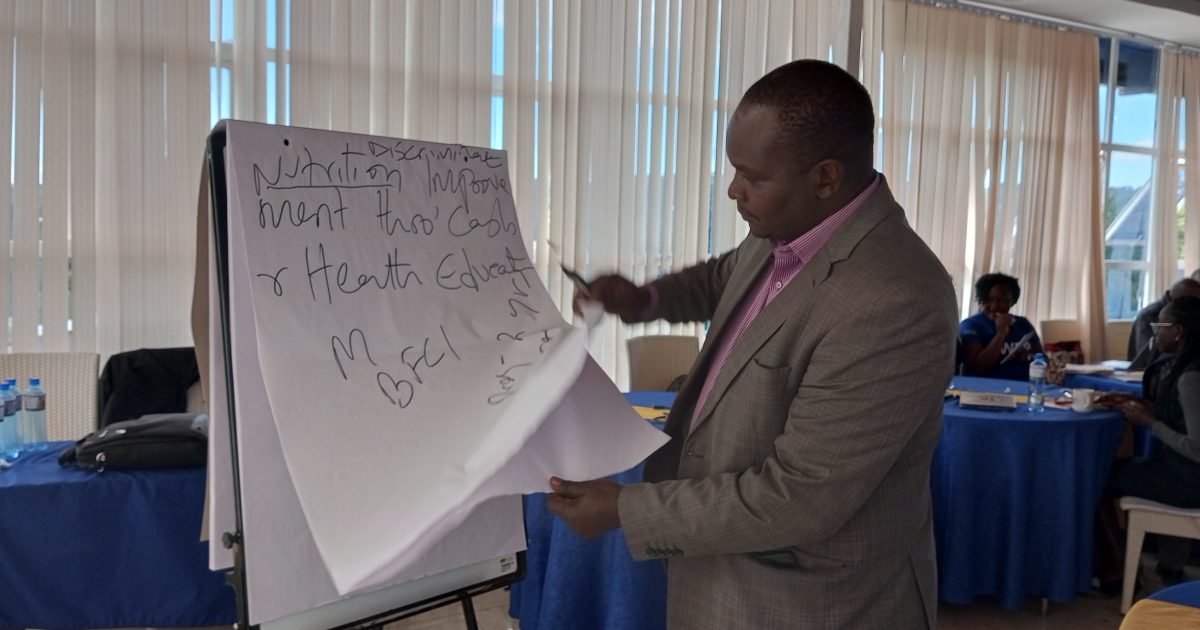Multisectoral stakeholder approaches to fighting malnutrition in West Pokot County have helped to improve coordination of nutrition actions in the county, leading to a decline in cases of malnutrition over the years.
West Pokot County Medical Officer of Health, Dr. Solomon Kokwo, hinted that the cases of malnutrition in the county have reduced due to the concerted efforts of multisectoral and multistakeholder approaches in which they have been finding inventive and creative solutions for fighting and mitigating the effects of malnutrition.
Dr. Kokwo noted that the efforts of leaders from health, education, social protection, agriculture, water children’s offices, and non-governmental organizations (NGOs) and good will from the government have led to drastic success in measures in the fight against malnutrition in the region.
He further noted: “A multisectoral and multistakeholder approach to tackle matters of nutrition has enabled the team to mobilize resources for the implementation of nutrition programmes and projects that have helped fight and mitigate the effects of malnutrition.”
He added that the county government has partnered with non-governmental organizations like Action Against Hunger, World Vision International (WVI), the World Food Programme (WFP), the Africa Medical Research Foundation (AMREF), the International Rescue Committee (IRC), the Kenya Red Cross (KRC), and other partners who have been key in supporting the health team to be able to improve malnutrition cases in the region.
He went on: “So we have been able to assign some wards to specific partners to tackle some specific health challenges, especially nutrition.” “For example, IRC covered most parts of upper Riwo ward, followed by Action against Hunger supporting the rest of the other wards in the county,” he said.
Dr. Kokwo underscored that the World Vision organization has been supporting the logistics and distribution of food supplements in the region.
“We have seen improvement over the years since 2010 to date in the fight against malnutrition by the government and other partners,” Dr. Kokwo disclosed.
He further disclosed that malnutrition cases have been reduced by 10 percent due to the concerted efforts of partners and other nutrition-sensitive actors, adding that stunting has decreased too.
He said the community has been mobilized for behavioural change on how they can produce food and how well they can consume it.
The official lauded the government for taking measures to beef up security in the region, especially for those living along the borders of Uganda and Turkana, for it enables families to settle down and be able to do farming.
“The ministry of interior, through the county commissioner’s office, has also assisted in tackling cases of instability and insecurity along the West Pokot, Uganda, and Turkana border, which has helped families settle down and be able to do farming,” he lauded.
In the agriculture sector, he noted that the sector has educated farmers to be able to produce safe, nutritious, and sustainable food for themselves and their families.
He explained that the Ministry of Education is an important partner in the health sector because the school feeding programme has helped reduced cases of vulnerability arising from food insecurity and bring down the malnutrition rate among school-going children.
He termed the school feeding programme a good approach that has helped to alleviate the health and developmental consequences of childhood malnutrition, retain learners, and reduce absenteeism cases in schools.
“We have also linked very closely with other actors, like the Social Services Department, through the Nutrition Improvement through Cash and Health Education (NICHE) programme, which has helped to improve the nutrition status of children under the age of two years through intense nutritional counselling and additional cash to eligible households that are already recipients of the Government of Kenya Inua Jamiii cash transfer program,” the medical officer stated.
He narrated that under the NICHE programme, families have benefited from a sh500 donation for purchasing food items for them.
He pointed out the power of aggressive advocacy in print and electronic media, which has helped in the fight against malnutrition in the region, thus reducing the number of malnutrition cases in the county over the years.
“Partnership with nutrition-sensitive actors has enabled West Pokot County to reduce malnutrition cases over time compared to before, when such cases were high,” he stated.
He predicted that in the next 5 or 10 years, West Pokot County will be almost on par with the rest of the country on matters of nutrition indicators.
“In the next 5 or 10 years, we will probably surpass some of the counties that have challenges and are yet to focus on matters related to malnutrition,” he predicted.
He urged for continued multi-sector and other stakeholders’ collaboration with all health actors in the fight against malnutrition.
“We are doing well, and we pray that we continue doing well and that we collaborate further with all health actors for the success of the fight against malnutrition.”
He said the upper areas of the county are agricultural, and the lower part is pastoral.
He noted the lower areas of Riwo, Endugh, and parts of Sook wards are facing food shortages due to drought effects contributed by a high rate of crop loss and malnutrition.
He mentioned that farmers in areas affected by drought are not able to produce food that can sustain their families for consumption or commercial purposes due to the effects of climate change.
By Anthony Melly and Maurice Osore





